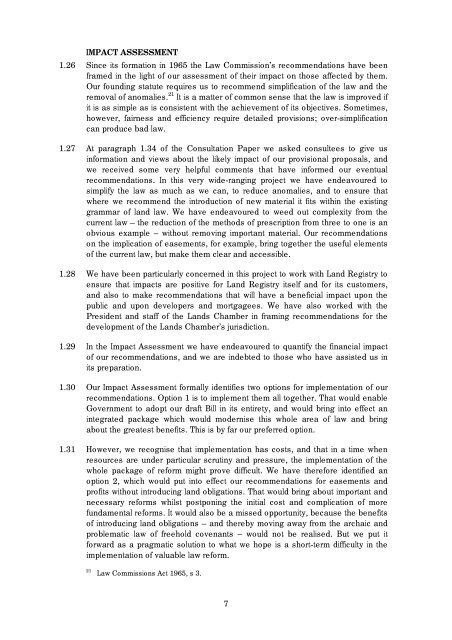Making Land Work: Easements, Covenants and ... - Law Commission
Making Land Work: Easements, Covenants and ... - Law Commission
Making Land Work: Easements, Covenants and ... - Law Commission
Create successful ePaper yourself
Turn your PDF publications into a flip-book with our unique Google optimized e-Paper software.
IMPACT ASSESSMENT<br />
1.26 Since its formation in 1965 the <strong>Law</strong> <strong>Commission</strong>’s recommendations have been<br />
framed in the light of our assessment of their impact on those affected by them.<br />
Our founding statute requires us to recommend simplification of the law <strong>and</strong> the<br />
removal of anomalies. 21 It is a matter of common sense that the law is improved if<br />
it is as simple as is consistent with the achievement of its objectives. Sometimes,<br />
however, fairness <strong>and</strong> efficiency require detailed provisions; over-simplification<br />
can produce bad law.<br />
1.27 At paragraph 1.34 of the Consultation Paper we asked consultees to give us<br />
information <strong>and</strong> views about the likely impact of our provisional proposals, <strong>and</strong><br />
we received some very helpful comments that have informed our eventual<br />
recommendations. In this very wide-ranging project we have endeavoured to<br />
simplify the law as much as we can, to reduce anomalies, <strong>and</strong> to ensure that<br />
where we recommend the introduction of new material it fits within the existing<br />
grammar of l<strong>and</strong> law. We have endeavoured to weed out complexity from the<br />
current law – the reduction of the methods of prescription from three to one is an<br />
obvious example – without removing important material. Our recommendations<br />
on the implication of easements, for example, bring together the useful elements<br />
of the current law, but make them clear <strong>and</strong> accessible.<br />
1.28 We have been particularly concerned in this project to work with <strong>L<strong>and</strong></strong> Registry to<br />
ensure that impacts are positive for <strong>L<strong>and</strong></strong> Registry itself <strong>and</strong> for its customers,<br />
<strong>and</strong> also to make recommendations that will have a beneficial impact upon the<br />
public <strong>and</strong> upon developers <strong>and</strong> mortgagees. We have also worked with the<br />
President <strong>and</strong> staff of the <strong>L<strong>and</strong></strong>s Chamber in framing recommendations for the<br />
development of the <strong>L<strong>and</strong></strong>s Chamber’s jurisdiction.<br />
1.29 In the Impact Assessment we have endeavoured to quantify the financial impact<br />
of our recommendations, <strong>and</strong> we are indebted to those who have assisted us in<br />
its preparation.<br />
1.30 Our Impact Assessment formally identifies two options for implementation of our<br />
recommendations. Option 1 is to implement them all together. That would enable<br />
Government to adopt our draft Bill in its entirety, <strong>and</strong> would bring into effect an<br />
integrated package which would modernise this whole area of law <strong>and</strong> bring<br />
about the greatest benefits. This is by far our preferred option.<br />
1.31 However, we recognise that implementation has costs, <strong>and</strong> that in a time when<br />
resources are under particular scrutiny <strong>and</strong> pressure, the implementation of the<br />
whole package of reform might prove difficult. We have therefore identified an<br />
option 2, which would put into effect our recommendations for easements <strong>and</strong><br />
profits without introducing l<strong>and</strong> obligations. That would bring about important <strong>and</strong><br />
necessary reforms whilst postponing the initial cost <strong>and</strong> complication of more<br />
fundamental reforms. It would also be a missed opportunity, because the benefits<br />
of introducing l<strong>and</strong> obligations – <strong>and</strong> thereby moving away from the archaic <strong>and</strong><br />
problematic law of freehold covenants – would not be realised. But we put it<br />
forward as a pragmatic solution to what we hope is a short-term difficulty in the<br />
implementation of valuable law reform.<br />
21 <strong>Law</strong> <strong>Commission</strong>s Act 1965, s 3.<br />
7
















